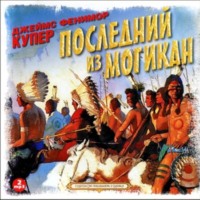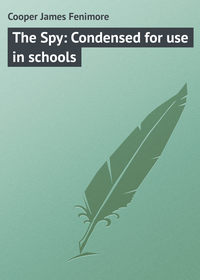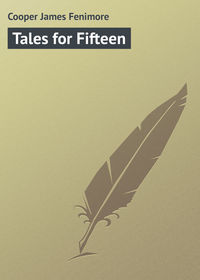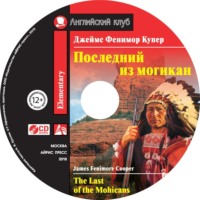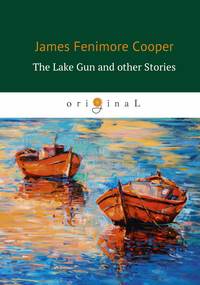 полная версия
полная версияMercedes of Castile: or, The Voyage to Cathay
"The man is, then, either of a weak mind, or of a light ambition."
"He is neither. In mind, he hath outdone many of our most learned churchmen; and it is due to his piety to say that a more devout Christian doth not exist in Spain. It is plain, son, that thou hast been much abroad, and little at court, or thou wouldst have known the history of this extraordinary being, at the mention of his name, which has been the source of merriment for the frivolous and gay this many a year, and which has thrown the thoughtful and prudent into more doubts than many a fierce and baneful heresy."
"Thou stirrest my curiosity, father, by such language. Who and what is the man?"
"An enigma, that neither prayers to the Virgin, the learning of the cloisters, nor a zealous wish to reach the truth, hath enabled me to read. Come hither, Luis, to this bit of rock, where we can be seated, and I will relate to thee the opinions that render this being so extraordinary. Thou must know, son, it is now seven years since this man first appeared among us. He sought employment as a discoverer, pretending that, by steering out into the ocean, on a western course, for a great and unheard-of distance, he could reach the farther Indies, with the rich island of Cipango, and the kingdom of Cathay, of which one Marco Polo hath left us some most extraordinary legends!"
"By St. James of blessed memory! the man must be short of his wits!" interrupted Don Luis, laughing. "In what way could this thing be, unless the earth were round – the Indies lying east, and not west of us?"
"That hath been often objected to his notions; but the man hath ready answers to much weightier arguments."
"What weightier than this can be found? Our own eyes tell us that the earth is flat."
"Therein he differeth from most men – and to own the truth, son Luis, not without some show of reason. He is a navigator, as thou wilt understand, and he replies that, on the ocean, when a ship is seen from afar, her upper sails are first perceived, and that as she draweth nearer, her lower sails, and finally her hull cometh into view. But thou hast been over sea, and may have observed something of this?"
"Truly have I, father. While mounting the English sea, we met a gallant cruiser of the king's, and, as thou said'st, we first perceived her upper sail, a white speck upon the water; then followed sail after sail, until we came nigh and saw her gigantic hull, with a very goodly show of bombards and cannon – some twenty at least, in all."
"Then thou agreest with this Colon, and thinkest the earth round?"
"By St. George of England! not I. I have seen too much of the world, to traduce its fair surface in so heedless a manner. England, France, Burgundy, Germany, and all those distant countries of the north, are just as level and flat as our own Castile."
"Why, then, didst thou see the upper sails of the Englishman first?"
"Why, father – why – because they were first visible. Yes, because they came first into view."
"Do the English put the largest of their sails uppermost on the masts?"
"They would be fools if they did. Though no great navigators – our neighbors the Portuguese, and the people of Genoa, exceeding all others in that craft – though no great navigators, the English are not so surpassingly stupid. Thou wilt remember the force of the winds, and understand that the larger the sail the lower should be its position."
"Then how happened it that thou sawest the smaller object before the larger?"
"Truly, excellent Fray Pedro, thou hast not conversed with this Christoforo for nothing! A question is not a reason."
"Socrates was fond of questions, son; but he expected answers."
"Peste! as they say at the court of King Louis. I am not Socrates, my good father, but thy old pupil and kinsman, Luis de Bobadilla, the truant nephew of the queen's favorite, the Marchioness of Moya, and as well-born a cavalier as there is in Spain – though somewhat given to roving, if my enemies are to be believed."
"Neither thy pedigree, thy character, nor thy vagaries, need be given to me, Don Luis de Bobadilla, since I have known thee and thy career from childhood. Thou hast one merit that none will deny thee, and that is, a respect for truth; and never hast thou more completely vindicated thy character, in this particular, than when thou saidst thou were not Socrates."
The worthy friar's good-natured smile, as he made this sally, took off some of its edge; and the young man laughed, as if too conscious of his own youthful follies to resent what he heard.
"But, dear Fray Pedro, lay aside thy government, for once, and stoop to a rational discourse with me on this extraordinary subject. Thou, surely, wilt not pretend that the earth is round?"
"I do not go as far as some, on this point, Luis, for I see difficulties with Holy Writ, by the admission. Still, this matter of the sails much puzzleth me, and I have often felt a desire to go from one port to another, by sea, in order to witness it. Were it not for the exceeding nausea that I ever feel in a boat, I might attempt the experiment."
"That would be a worthy consummation of all thy wisdom!" exclaimed the young man, laughing. "Fray Pedro de Carrascal turned rover, like his old pupil, and that, too, astride a vagary! But set thy heart at rest, my honored kinsman and excellent instructor, for I can save thee the trouble. In all my journeyings, by sea and by land – and thou knowest that, for my years, they have been many – I have ever found the earth flat, and the ocean the flattest portion of it, always excepting a few turbulent and uneasy waves."
"No doubt it so seemeth to the eye; but this Colon, who hath voyaged far more than thou, thinketh otherwise. He contendeth that the earth is a sphere, and that, by sailing west, he can reach points that have been already attained by journeying east."
"By San Lorenzo! but the idea is a bold one! Doth the man really propose to venture out into the broad Atlantic, and even to cross it to some distant and unknown land?"
"That is his very idea; and for seven weary years hath he solicited the court to furnish him with the means. Nay, as I hear, he hath passed much more time – other seven years, perhaps – in urging his suit in different lands."
"If the earth be round," continued Don Luis, with a musing air, "what preventeth all the water from flowing to the lower parts of it? How is it, that we have any seas at all? and if, as thou hast hinted, he deemeth the Indies on the other side, how is it that their people stand erect? – it cannot be done without placing the feet uppermost."
"That difficulty hath been presented to Colon, but he treateth it lightly. Indeed, most of our churchmen are getting to believe that there is no up, or down, except as it relateth to the surface of the earth; so that no great obstacle existeth in that point."
"Thou would'st not have me understand, father, that a man can walk on his head – and that, too, with the noble member in the air? By San Francisco! thy men of Cathay must have talons like a cat, or they would be falling, quickly!"
"Whither, Luis?"
"Whither, Fray Pedro? – to Tophet, or the bottomless pit. It can never be that men walk on their heads, heels uppermost, with no better foundation than the atmosphere. The caravels, too, must sail on their masts – and that would be rare navigation! What would prevent the sea from tumbling out of its bed, and falling on the Devil's fires and extinguishing them?"
"Son Luis," interrupted the monk, gravely, "thy lightness of speech is carried too far. But, if thou so much deridest the opinion of this Colon, what are thine own notions of the formation of this earth, that God hath so honored with his spirit and his presence?"
"That it is as flat as the buckler of the Moor I slew in the last sortie, which is as flat as steel can hammer iron."
"Dost thou think it hath limits?"
"That do I – and please heaven, and Doña Mercedes de Valverde, I will see them before I die!"
"Then thou fanciest there is an edge, or precipice, at the four sides of the world, which men may reach, and where they can stand and look off, as from an exceeding high platform?"
"The picture doth not lose, father, for the touch of thy pencil! I have never bethought me of this before; and yet some such spot there must be, one would think. By San Fernando, himself! that would be a place to try the metal of even Don Alonso de Ojeda, who might stand on the margin of the earth, put his foot on a cloud, and cast an orange to the moon!"
"Thou hast bethought thee little of any thing serious, I fear, Luis; but to me, this opinion and this project of Colon are not without merit. I see but two serious objections to them, one of which is, the difficulty connected with Holy Writ; and the other, the vast and incomprehensible, nay, useless, extent of the ocean that must necessarily separate us from Cathay; else should we long since have heard from that quarter of the world."
"Do the learned favor the man's notions?"
"The matter hath been seriously argued before a council held at Salamanca, where men were much divided upon it. One serious obstacle is the apprehension that should the world prove to be round, and could a ship even succeed in getting to Cathay by the west, there would be great difficulty in her ever returning, since there must be, in some manner, an ascent and a descent. I must say that most men deride this Colon; and I fear he will never reach his island of Cipango, as he doth not seem in the way even to set forth on the journey. I marvel that he should now be here, it having been said he had taken his final departure for Portugal."
"Dost thou say, father, that the man hath long been in Spain?" demanded Don Luis, gravely, with his eye riveted on the dignified form of Columbus, who stood calmly regarding the gorgeous spectacle of the triumph, at no great distance from the rock where the two had taken their seats.
"Seven weary years hath he been soliciting the rich and the great to furnish him with the means of undertaking his favorite voyage."
"Hath he the gold to prefer so long a suit?"
"By his appearance, I should think him poor – nay, I know that he hath toiled for bread, at the occupation of a map-maker. One hour he hath passed in arguing with philosophers and in soliciting princes, while the next hath been occupied in laboring for the food that he hath taken for sustenance."
"Thy description, father, hath whetted curiosity to so keen an edge, that I would fain speak with this Colon. I see he remaineth yonder, in the crowd, and will go and tell him that I, too, am somewhat of a navigator, and will extract from him a few of his peculiar ideas."
"And in what manner wilt thou open the acquaintance, son?"
"By telling him that I am Don Luis de Bobadilla, the nephew of the Doña Beatriz of Moya, and a noble of one of the best houses of Castile."
"And this, thou thinkest, will suffice for thy purpose, Luis!" returned the friar, smiling. "No – no – my son; this may do with most map-sellers, but it will not effect thy wishes with yonder Christoval Colon. That man is so filled with the vastness of his purposes; is so much raised up with the magnitude of the results that his mind intently contemplateth, day and night; seemeth so conscious of his own powers, that even kings and princes can, in no manner, lessen his dignity. That which thou proposest, Don Fernando, our honored master, might scarcely attempt, and hope to escape without some rebuke of manner, if not of tongue."
"By all the blessed saints! Fray Pedro, thou givest an extraordinary account of this man, and only increasest the desire to know him. Wilt thou charge thyself with the introduction?"
"Most willingly, for I wish to inquire what hath brought him back to court, whence, I had understood, he lately went, with the intent to go elsewhere with his projects. Leave the mode in my hands, son Luis, and we will see what can be accomplished."
The friar and his mercurial young companion now arose from their seats on the rock, and threaded the throng, taking the direction necessary to approach the man who had been the subject of their discourse, and still remained that of their thoughts. When near enough to speak, Fray Pedro stopped, and stood patiently waiting for a moment when he might catch the navigator's eye. This did not occur for several minutes, the looks of Colon being riveted on the towers of the Alhambra, where, at each instant, the signal of possession was expected to appear; and Luis de Bobadilla, who, truant, and errant, and volatile, and difficult to curb, as he had proved himself to be, never forgot his illustrious birth and the conventional distinctions attached to personal rank, began to manifest his impatience at being kept so long dancing attendance on a mere map-seller and a pilot. He in vain urged his companion to advance, however; but one of his own hurried movements at length drew aside the look of Columbus, when the eyes of the latter and of the friar met, and being old acquaintances, they saluted in the courteous manner of the age.
"I felicitate you, Señor Colon, on the glorious termination of this siege, and rejoice that you are here to witness it, as I had heard affairs of magnitude had called you to another country."
"The hand of God, father, is to be traced in all things. You perceive in this success the victory of the cross; but to me it conveyeth a lesson of perseverance, and sayeth as plainly as events can speak, that what God hath decreed, must come to pass."
"I like your application, Señor; as, indeed, I do most of your thoughts on our holy religion. Perseverance is truly necessary to salvation; and I doubt not that a fitting symbol to the same may be found in the manner in which our pious sovereigns have conducted this war, as well as in its glorious termination."
"True, father; and also doth it furnish a symbol to the fortunes of all enterprises that have the glory of God and the welfare of the church in view," answered Colon, or Columbus, as the name has been Latinized; his eye kindling with that latent fire which seems so deeply seated in the visionary and the enthusiast. "It may seem out of reason to you, to make such applications of these great events; but the triumph of their Highnesses this day, marvellously encourageth me to persevere, and not to faint, in my own weary pilgrimage, both leading to triumphs of the cross."
"Since you are pleased to speak of your own schemes, Señor Colon," returned the friar, ingenuously, "I am not sorry that the matter hath come up between us; for here is a youthful kinsman of mine, who hath been somewhat of a rover, himself, in the indulgence of a youthful fancy, that neither friends nor yet love could restrain; and having heard of your noble projects, he is burning with a desire to learn more of them from your own mouth, should it suit your condescension so to indulge him."
"I am always happy to yield to the praiseworthy wishes of the young and adventurous, and shall cheerfully communicate to your young friend all he may desire to know," answered Columbus, with a simplicity and dignity that at once put to flight all the notions of superiority and affability with which Don Luis had intended to carry on the conversation, and which had the immediate effect to satisfy the young man that he was to be the obliged and honored party, in the intercourse that was to follow. "But, Señor, you have forgotten to give me the name of the cavalier."
"It is Don Luis de Bobadilla, a youth whose best claims to your notice, perhaps, are, a most adventurous and roving spirit, and the fact that he may call your honored friend, the Marchioness of Moya, his aunt."
"Either would be sufficient, father. I love the spirit of adventure in the youthful; for it is implanted, no doubt, by God, in order that they may serve his all-wise and beneficent designs; and it is of such as these that my own chief worldly stay and support must be found. Then, next to Father Juan Perez de Marchena and Señor Alonzo de Quintanilla, do I esteem Doña Beatriz, among my fastest friends; her kinsman, therefore, will be certain of my esteem and respect."
All this sounded extraordinary to Don Luis; for, though the dress and appearance of this unknown stranger, who even spoke the Castilian with a foreign accent, were respectable, he had been told he was merely a pilot, or navigator, who earned his bread by toil; and it was not usual for the noblest of Castile to be thus regarded, as it might be, with a condescending favor, by any inferior to those who could claim the blood and lineage of princes. At first he was disposed to resent the words of the stranger; then to laugh in his face; but, observing that the friar treated him with great deference, and secretly awed by the air of the reputed projector, he was not only successful in maintaining a suitable deportment, but he made a proper and courteous reply, such as became his name and breeding. The three then retired together, a little aloof from the thickest of the throng, and found seats, also, on one of the rocks, of which so many were scattered about the place.
"Don Luis hath visited foreign lands, you say, father," said Columbus, who did not fail to lead the discourse, like one entitled to it by rank, or personal claims, "and hath a craving for the wonders and dangers of the ocean?"
"Such hath been either his merit or his fault, Señor; had he listened to the wishes of Doña Beatriz, or to my advice, he would not have thrown aside his knightly career for one so little in unison with his training and birth."
"Nay, father, you treat the youth with unmerited severity; he who passeth a life on the ocean, cannot be said to pass it in either an ignoble or a useless manner. God separated different countries by vast bodies of water, not with any intent to render their people strangers to each other, but, doubtless, that they might meet amid the wonders with which he hath adorned the ocean, and glorify his name and power so much the more. We all have our moments of thoughtlessness in youth – a period when we yield to our impulses rather than to our reason; and as I confess to mine, I am little disposed to bear too hard on Señor Don Luis, that he hath had his."
"You have probably battled with the Infidel, by sea, Señor Colon," observed the young man, not a little embarrassed as to the manner in which he should introduce the subject he most desired.
"Ay, and by land, too, son" – the familiarity startled the young noble, though he could not take offence at it – "and by land, too. The time hath been, when I had a pleasure in relating my perils and escapes, which have been numerous, both from war and tempests; but, since the power of God hath awakened my spirit to mightier things, that his will may be done, and his word spread throughout the whole earth, my memory ceaseth to dwell on them." Fray Pedro crossed himself, and Don Luis smiled and shrugged his shoulders, as one is apt to do when he listens to any thing extravagant; but the navigator proceeded in the earnest, grave manner that appeared to belong to his character. "It is now very many years since I was engaged in that remarkable combat between the forces of my kinsman and namesake, the younger Colombo, as he was called, to distinguish him from his uncle, the ancient admiral of the same name, which took place not far north from Cape St. Vincent. On that bloody day, we contended with the foe – Venetians, richly laden – from morn till even, and yet the Lord carried me through the hot contest unharmed. On another occasion, the galley in which I fought was consumed by fire, and I had to find my way to land – no trifling distance – by the aid of an oar. To me, it seemeth that the hand of God was in this, and that he would not have taken so signal and tender a care of one of his insignificant creatures, unless to use him largely for his own honor and glory."
Although the eye of the navigator grew brighter as he uttered this, and his cheek flushed with a species of holy enthusiasm, it was impossible to confound one so grave, so dignified, so measured even in his exaggerations (if such they were), with the idle and light-minded, who mistake momentary impulses for indelible impressions, and passing vanities for the convictions that temper character. Fray Pedro, instead of smiling, or in any manner betraying that he regarded the other's opinions lightly, devoutly crossed himself again, and showed by the sympathy expressed in his countenance, how much he entered into the profound religious faith of the speaker.
"The ways of God are often mysterious to his creatures," said the friar; "but we are taught that they all lead to the exaltation of his name and to the glory of his attributes."
"It is so that I consider it, father; and with such views have I always regarded my own humble efforts to honor him. We are but instruments, and useless instruments, too, when we look at how little proceedeth from our own spirits and power."
"There cometh the blessed symbol that is our salvation and guide!" exclaimed the friar, holding out both arms eagerly, as if to embrace some distant object in the heavens, immediately falling to his knees, and bowing his shaven and naked head, in deep humility, to the earth.
Columbus turned his eyes in the direction indicated by his companion's gestures, and he beheld the large silver cross that the sovereigns had carried with them throughout the late war, as a pledge of its objects, glittering on the principal tower of the Alhambra. At the next instant, the banners of Castile and of St. James were unfolded from other elevated places. Then came the song of triumph, mingled with the chants of the church. Te Deum was sung, and the choirs of the royal chapel chanted in the open fields the praises of the Lord of Hosts. A scene of magnificent religious pomp, mingled with martial array, followed, that belongs rather to general history than to the particular and private incidents of our tale.
CHAPTER V
"Who hath not proved how feebly words essayTo fix one spark of beauty's heavenly ray?Who doth not feel, until his failing sightFaints into dimness with its own delight,His changing cheek, his sinking heart confessThe might – the majesty of loveliness!"Byron.That night the court of Castile and Aragon slept in the palace of the Alhambra. As soon as the religious ceremony alluded to in the last chapter had terminated, the crowd rushed into the place, and the princes followed, with a dignity and state better suited to their high character. The young Christian nobles, accompanied by their wives and sisters – for the presence of Isabella, and the delay that attended the surrender, had drawn together a vast many of the gentler sex, in addition to those whose duty it was to accompany their royal mistress – hurried eagerly through the celebrated courts and fretted apartments of this remarkable residence; nor was curiosity appeased even when night came to place a temporary stay to its indulgence. The Court of the Lions in particular, a place still renowned throughout Christendom for its remains of oriental beauty, had been left by Boabdil in the best condition; and, although it was midwinter, by the aid of human art it was even then gay with flowers; while the adjacent halls, those of the Two Sisters and of Abencerrages, were brilliant with light, and alive with warriors and courtiers, dignified priests and luxuriant beauty.
Although no Spanish eye could be otherwise than familiar with the light peculiar graces of Moorish architecture, these of the Alhambra so much surpassed those of any other palace which had been erected by the Mussulman dynasties of that part of the world, that their glories struck the beholders with the freshness of novelty, as well as with the magnificence of royalty. The rich conceits in stucco, an art of eastern origin then little understood in Christendom; the graceful and fanciful arabesques – which, improved on by the fancies of some of the greatest geniuses the world ever saw, have descended to our own times, and got to be so familiar in Europe, though little known on this side of the Atlantic – decorated the walls, while brilliant fountains cast their waters into the air, and fell in glittering spray, resembling diamonds.
Among the throng that moved through this scene of almost magical beauty, was Beatriz de Bobadilla, who had long been the wife of Don Andres de Cabrera, and was now generally known as the Marchioness of Moya; the constant, near, and confidential friend of the queen, a character she retained until her royal mistress was numbered with the dead. On her arm leaned lightly a youthful female, of an appearance so remarkable, that few strangers would have passed her without turning to take a second look at features and a countenance that were seldom seen and forgotten. This was Doña Mercedes de Valverde, one of the noblest and richest heiresses of Castile; the relative, ward, and adopted daughter of the queen's friend – favorite being hardly the term one would apply to the relation in which Doña Beatriz stood toward Isabella. It was not the particular beauty of Doña Mercedes, however, that rendered her appearance so remarkable and attractive; for, though feminine, graceful, of exquisite form, and even of pleasing features, there were many in that brilliant court who would generally be deemed fairer. But no other maiden of Castile had a countenance so illuminated by the soul within, or no other female face habitually wore so deep an impression of sentiment and sensibility; and the professed physiognomist would have delighted to trace the evidences of a deeply-seated, earnest, but unobtrusive enthusiasm, which even cast a shade of melancholy over a face that fortune and the heart had equally intended should be sunny and serene. Serene it was, notwithstanding; the shadow that rested on it seeming to soften and render interesting its expression, rather than to disturb its tranquillity or to cloud its loveliness.



